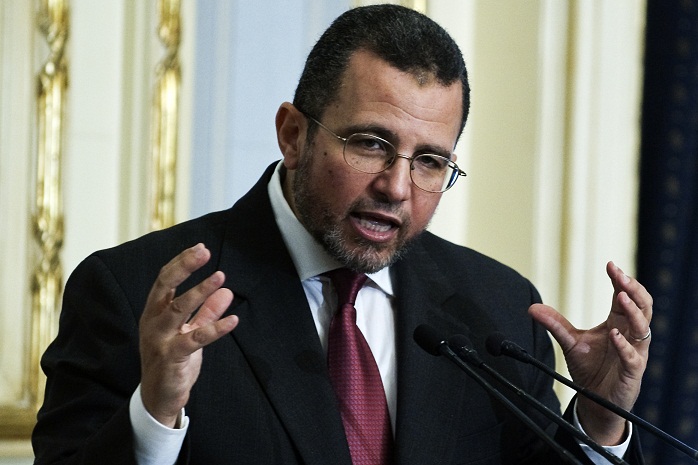
(Photo handout by TIEC)
By Mohamed Alaa El-Din
The Technology Innovation and Entrepreneurship Center (TIEC) plans to offer a tender by the end of 2015 to select a company for the management of venture capital investment funds to finance start-ups. TIEC is working on establishing this fund in cooperation with the private sector.
Hossam Osman, Acting Manager of TIEC, said in an interview with Daily News Egypt that the centre is currently negotiating with more than 14 entities interested in investing in the entrepreneurship sector. These negotiations are for collaboration in the establishment of two or three funds for investment in start-up companies. This is on the condition that the government’s share would be 20% of the fund’s capital, divided equally between TIEC and the Social Fund for Development.
On the other hand, TIEC is also working on cooperating with the World Bank to examine preparing the legislative climate for entrepreneurship through viewing other countries’ experiences in this filed, such as the US.
What is the difference between technological innovation and entrepreneurship?
Innovation means creativity, on the condition of providing a high added-value. This added value could be an economic value through achieving significant financial returns from this creativity. It could also be a social value by offering a certain service to a large segment of society that would contribute to solving societal problems.
As for what’s meant by technological, it is the use of technology as a tool in the innovation process to achieve the added value or the invention of a new added value through the invention of new technology.
While entrepreneurship means employing innovation in creating an added value through founding new start-up companies based on creativity and innovation. That is why one of TIEC’s tasks is to encourage and support entrepreneurships that are based on creativity in Information Technology.
As for the difference between them; entrepreneurship does not stop at innovation, but works on such innovation through establishing a company, employing labour, and turning it into a real business field. This is done through developing an action plan, and identifying the business model in terms of revenue source, mechanism of generating revenues, profit-taking plan, and identifying target customers. While innovation stops at creativity, even if the innovator sold their invention or service and achieved economic value of this step, but it is still not called entrepreneurship.
What are the necessary qualities of an entrepreneur?
They must have a strong belief in their ideas and projects, have enough courage to take risky steps, and they must have enough time for his project by working on it full-time. An entrepreneur must also have the capacity to overcome challenges, turning failure into a new success story, and should believe that his ambition has no limit.
Also, an entrepreneur should have a harmonious team, team management skills, the ability to properly exploit resources, and determine his project’s target customers.
What is TIEC’s budget?
This year, TIEC’s budget was EGP 25m, and by the end of the fiscal year which concludes this June, we will have invested our full budget. We do not think the budget will be increased over the new FY, but there are some programmes we are offering to start-ups, and we are depending on the budget of the Information Technology Industry Development Agency (ITIDA) for financing them.
What are the most prominent issues facing entrepreneurship locally? What are your plans to overcome them?
There are three main issues facing entrepreneurship in Egypt: the unavailability of enough funding for emerging companies, legislative policies and laws, and the lack of innovation in education.
We are working on solving the first issue through discussions with a number of investment funds, companies, and individual investors to establish two or three funds with venture capital. We plan for the government’s share of these funds not to exceed 20% maximum, and the remaining percentage would be for the private sector.
We are currently holding discussions with more than 14 entities interested in investing in the entrepreneurship sector to establish funds. And we expect that a tender will be offered by the end of this year to choose the company that will manage the funds. A similar example of the government’s role in the fund is when TIEC took part in the fund’s capital with 10%, in addition to 10% from the Social Fund for Development (SFD). This was part of activating the cooperation agreement that was recently signed with the SFD, which includes studies for establishing a co-financing fund.
The second issue concerns some laws and legislations that slow down the growth of entrepreneurship locally. Some laws within the telecommunications law will have a positive role if applied as a step towards legislative reform for the surrounding environment of entrepreneurship. These laws include copyright laws, cyber security, and the freedom for information trade.
We also cooperate with the World Bank to look into the legislations that need amendment, to provide a suitable environment for entrepreneurship. This is done through looking into the experiences of other countries like the US and some developed countries in the Middle East, so that recommendations are given to the Ministry of Communications for amendments.
The third issue concerns education and the lack of an innovative culture among the youth. We are currently working on encouraging university students to innovate and use their creativity to experience entrepreneurship through providing summer training programmes. These programmes are given to 1,000 information technology students a year. We expect that the number will reach 2,000 students. We also plan to create an innovative culture for the youth from a young age, through curricula, especially in primary and preparatory school.
What is your vision for the entrepreneurship community through the steps you mentioned?
We plan to let the whole world know of Egyptians’ potential in innovative technology. We hope to make Egypt the new Silicon Valley in the Middle East through a sustainable entrepreneurship community. As per our strategic plan, by 2030, we aim to make Egypt one of the top 40 countries that use technology, and one of the top 20 countries in the world that use innovative technology and patents.
Is Egypt behind in catching up with the innovative technology race?
We are behind indeed, compared to many of the world’s countries in this regard. However, we are witnessing fast technological development and we can help speed up the steps for achieving our goals in terms of creating an innovative community and a strong environment for entrepreneurship.
What is the volume of funding for a single company?
Companies get their funding from the centre, with a maximum amount of EGP 120,000, without the centre retaining any shares.


